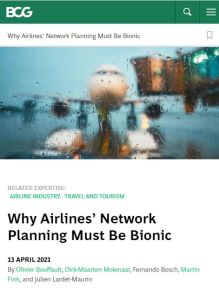COVID-19 was bad for the airline industry, but every adversity comes with hidden opportunities – or so the motivational posters would have you believe. So what opportunities for improvement has COVID-19 highlighted? Look no further than your favorite airline’s scheduling and network planning departments. They weren’t operating efficiently enough even before the virus took hold; the pandemic just made inefficiencies impossible to ignore. In this special report from the Boston Consulting Group, you’ll find a blueprint for more dexterous, flexible schedule and network planning.
Airline scheduling and network planning departments need to prepare for a future of volatile sales, near-term bookings and staffing difficulties.
As the pandemic winds down, travel is becoming an option again for many people, but that doesn’t mean they’ll be planning in advance when booking their flights. Post-pandemic, people are more likely to book their tickets immediately before their flight, and may even change plans several times before actually taking the flight. Because health concerns are more prevalent, staff scheduling may be similarly volatile.
While the volatility will create challenges for all airline departments, the network planning and scheduling departments will be among the most affected. These departments were already struggling with efficiency pre-pandemic. Post-pandemic, the network planning and scheduling departments will have to transform into nimble, agile, bionic machines. They’ll have to use both human intelligence and technology to create rolling schedules that accommodate quick ...
Olivier Bouffault, Dirk-Maarten Molenaar, Fernando Bosch, Martin Fink and Julien Lardet-Maurin are professionals with the Boston Consulting Group.




















Comment on this summary